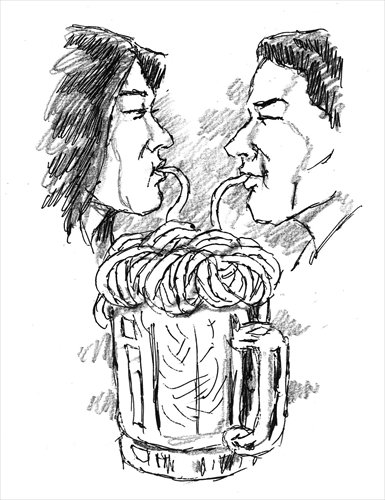Why Chinese people love to eat

Illustration: Peter C. Espina/GT
A Dutch friend of mine recently visited China for the first time. Nearly every evening, he was wined and dined by friends of his who live in the country, and at each fete he would almost inevitably be asked two questions: what do you think of the Dutch football team, and what is your favorite Chinese dish.
"I have no idea. I've been here for only a few days. I don't even know what my favorite Dutch dish is," my friend would reply each time, with a look practiced obliviousness. "For me, I'm happy to eat sandwiches for three meals a day."
After going through this ritual several times, my Dutch friend came to a simple conclusion: Chinese people are really into food and eating. My friend is right. As with many foreigners who come to China, he was surprised at just how much importance Chinese people place on eating.
Eating out is the glue that binds social life together in China: it's at the dinner table that you make friends, and it's at the dinner table that you close business deals. In addition, Chinese people are notorious for posting food photos on their social media feeds.
To my friend's understanding, Chinese people's obsession with food is partly because it is only in the last few decades that the country has emerged from the shadow of famine. In Western Europe, the last major famine was in the Netherlands in 1944, which killed around 20,000 people. In China, the famine that ravaged the country between 1959 and 1961 resulted in an estimated 10 to 30 million deaths. Having now thrown off the shackles of famine and poverty, people overcompensate by indulging in food to the point of gluttony.
I agree with my friend, to an extent. But I think Chinese people's love of food goes beyond recent history - it is part of our cultural history, going back thousands of years. For Chinese people over the eras, food has played a significant role in everyday rituals, celebrations, religions, and even politics.
In the Tao Te Ching, a seminal text dating back to the 4th century BC, Laozi, the founder of Taoism, compares the ruling of a state to the frying of a small fish: too much handling will spoil the delicate meat and make it (the fish and the state) fall apart. In religious life, food is presented as offerings to deities. In social life, food is seen as the greatest of earthly pleasures.
During the Cultural Revolution (1966-76), many mass entertainments such as dancing, film and popular music were heavily regulated. While in recent decades, these regulations have loosened considerably, many are still at loss when it comes to what to do for recreation - besides eating. Going to bars has never been part of traditional Chinese social habits, so eating is the primary way that people get together, unwind after a long day of work, and relax.
In China, eating is even considered to be a hobby. For many of my friends, it is their only one. When asked what they like doing in their spare time, their answer is always the same: "I'm a foodie and I really enjoy eating." This could be said for China as a whole.
This article was published on the Global Times Metropolitan section Two Cents page, a space for reader submissions, including opinion, humor and satire. The ideas expressed are those of the author alone, and do not represent the position of the Global Times.